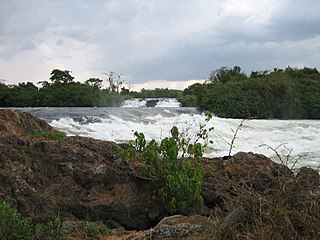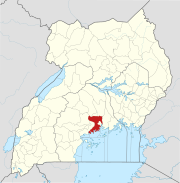
Burning of renewable resources provides approximately 90 percent of the energy in Uganda, though the government is attempting to become energy self-sufficient. While much of the hydroelectric potential of the country is untapped, the government decision to expedite the creation of domestic petroleum capacity coupled with the discovery of large petroleum reserves holds the promise of a significant change in Uganda's status as an energy-importing country.

The Ministry of Energy and Mineral Development, also Ministry of Energy, Oil and Mineral Development is one of the governmental bodies of Uganda. The ministry has the function of developing and implementing policies related to electricity, minerals, petroleum and petroleum products. The ministry is part of the national cabinet and is headed by a cabinet minister. The current Cabinet Minister of Energy is [Dr. Goretti Kitutu].

The Bujagali Power Station is a hydroelectric power station across the Victoria Nile that harnesses the energy of its namesake; the Bujagali Falls, in Uganda. Construction began in 2007 and concluded in 2012. It was officially inaugurated on 8 October 2012 by Ugandan President Yoweri Museveni and Aga Khan IV in the presence of African politicians and investors.

Kiira Hydroelectric Power Station, is a hydroelectric power station in Uganda, with an installed capacity of 200 megawatts (270,000 hp).
Tororo Thermal Power Station is a 89 MW (119,000 hp) heavy fuel oil-fired thermal power plant located in the town of Tororo in Tororo District in the Eastern Region of Uganda.

The Karuma Hydroelectric Power Station is a 600 MW hydroelectric power project under construction in Uganda. When completed, it will be the largest power-generating installation in the country.

Isimba Hydroelectric Power Station is a 183.2 megawatts (245,700 hp) hydroelectric power station commissioned on 21 March 2019 in Uganda. Construction of this dam began in April 2015 and was completed in January 2019. Commercial operations began on 21 March 2019.

The Muzizi Power Station is a proposed 45 megawatts (60,000 hp) hydroelectric power project in Uganda. The project, which has been planned for several years, has received a funding commitment from KfW and the French Development Agency.
Muvumbe Hydroelectric Power Station is a 6.5 megawatts (8,700 hp) hydroelectric power station in the Western Region of Uganda.
The Uganda Electricity Generation Company Limited (UEGCL) is a parastatal company whose primary purpose is to generate electric power for use in Uganda and for sale to neighboring countries. As of December 2017, UEGL's generation capacity was 380 megawatts, with that capacity planned to increase to over 1,300 megawatts, by 2023.
Tororo Solar Power Station, also Tororo Solar North Power Station, is a 10 megawatts (13,000 hp) solar power plant in Uganda, the third-largest economy in the East African Community.
The Soroti Power Station is a 10 MW (13,000 hp) solar power plant in Uganda. It was the largest grid-connected, "privately-funded solar power plant in Sub-Saharan Africa, outside of South Africa" at its commissioning and until the Pilot Solar Power Plant (20MW) of The Xsabo Group in Kabulasoke in Central Uganda was completed and commissioned in January 2019.
Eskom Uganda Limited (EUL) is the largest generator of energy in Uganda and was incorporated in 2002 for a 20 year concession under a government regulatory framework.

The Xsabo Group’s Pilot Solar Power Plant in Kabulasoke, also known as Kabulasole Solar Power Station or Namulaba Solar Power Station, is a 20 MW (27,000 hp) solar power plant in Uganda.
Mayuge Solar Power Station, also Bufulubi Solar Power Station, is an operational 10 MW (13,000 hp) solar power plant in Uganda.

Nkusi Hydroelectric Power Station, also referred to as Nkusi Power Station, is a 9.6 MW (12,900 hp) hydroelectric power station in the Western Region of Uganda.

Achwa 2 Hydroelectric Power Station is a 41 megawatts (55,000 hp) hydroelectric power plant, in Uganda.
The Xsabo Nkonge Power Station is a US$22 million 20 MW/AC solar power plant in Uganda that has been registered by the Electricity Regulatory Authority (ERA) in the national gazette for the implementation process following license issuance on 28 September 2020.
The Xsabo Lira Power Station is a US$45 million 50 MW/AC solar power plant in Uganda that will be implemented as a ‘’Public-Private-Partnership (PPP)’’ with Lira District Local Government. The corresponding Memorandum of Understanding (MoU) has been approved by the Attorney General of the Republic of Uganda.







